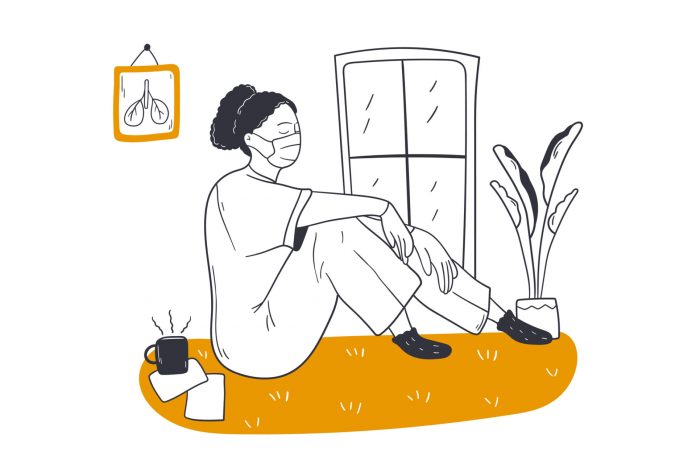Mental health refers to the general state of how you regulate your behavior, feelings and thoughts. There’s no standard for measuring what’s normal for you versus what could be a reason for concern in someone else, but poor mental health could negatively affect:
- How well you get along with family and friends
- Your productivity at work or school
- Your interest in activities, social settings and other situations
- Energy levels
Anxiety is an appropriate response to stressful situational triggers.
From navigating a public health crisis to feeling high political tensions, it’s no wonder many people are feeling a little uneasy this year. And truthfully, stress is a perfectly normal and appropriate way to respond to situational triggers such as COVID-19, a job loss or uncertainty around the election.
In fact, many people who have never had depression before 2020 have been diagnosed this year. And psychiatrists estimate about one-third of their patients who already had a depression diagnosis have experienced worsening symptoms this year.
For some, healthy habits can re-establish their mental health, helping them regain their equilibrium. For others, a situational trigger can cause a downward spiral that leads to anxiety or depression. When that happens, it may be time to re-evaluate how you take care of yourself.
If you just don’t feel like yourself, it could be a sign you need to take care of your mental health. If something just feels off, don’t ignore that feeling. When you don’t feel like yourself for an extended period of time–say three weeks–that’s a good sign you should reprioritize your mental health. If you can’t pinpoint exactly what that feels like, it could manifest itself in one of the following ways:
1. Troubled sleep. Poor sleep could be a sign you’re experiencing depression or anxiety. Whether you have trouble falling asleep or difficulty staying asleep—also known as “early morning wakening”—it could be a signal of a mental health concern. Frequent oversleeping could be a sign as well, demonstrating your body is fatigued to the point of burn-out.
2. Irritability. Experiencing irritation, anger, feeling snappy and easily frustrated, or mood swings that fly from one extreme to the other could be a sign your mental health is out of whack. Depression and anxiety can make it harder to regulate your thoughts and feelings, which is why you may be more reactive or sensitive than usual.
3. Loss of joy. It’s normal to have a bad day every now and then, and life is bound to bring you some sadness at some point. But if you routinely find less enjoyment in activities you used to love, it could be a sign something’s not quite right. For example, if you used to enjoy dancing or going to the movies but feel uninterested in participating in either of those activities right now, that could be an indicator your mental health is out of balance.
4. Change in appetite. Depression and anxiety can affect how much you eat in a variety of ways. For some, it may result in a loss of appetite. For others, binge eating comfort food can provide temporary relief from depressing thoughts and feelings. If you notice you are overeating or undereating to the point where you observe dramatic changes in your weight over a short period of time, it could be time to seek help for your mental health.
5. Worsening physical symptoms. Depression and anxiety can bring on physical side effects, including sweating, rapid heart rate, dizziness, gastrointestinal symptoms and headache. If physical symptoms come on suddenly with no other medical cause, it could be a sign your mental health is declining.
6. Low energy. Feeling fatigued or lethargic are also common in people who are struggling with their mental health. Feeling mentally or physically sluggish can make it harder to concentrate, follow conversations or think quickly. If you have low energy to the point where it’s hard to find the motivation to get out of bed, consider talking to your doctor.
The good news is you can improve your mental health at home. Not every sign of a mental health concern means you have a mental health disorder, like anxiety or depression. But it could mean you need to change something in your routine before your mental health worsens.
One of the best ways you can care for your mental health is by establishing healthy habits. These may include:
- Aiming for seven to eight hours of sleep each night with no screen time for 30 minutes before bed
- Eating healthy, balanced meals that consist of whole foods
- Exercising for 30 minutes a day, at least five days per week
- Hydrating well with water, eliminating excessive caffeine
- Practicing mindfulness and meditation
- Talking to someone you trust
- Avoiding excessive alcohol consumption (Women should drink fewer than 8 alcoholic beverages per week. Men should drink fewer than 14.)
If these healthy habits don’t help, don’t be ashamed to seek help from a professional. Talk to your primary care provider about what you’re going through and be prepared to answer questions related to your:
- Medical history
- Physical symptoms
- Current concerns, thoughts and feelings
- Use of alcohol or drugs
- Relationships
- Routines
A primary care doctor can recommend next steps, which could include treatment options such as counseling or medication. They can also provide advice to help you navigate the new normal 2020 has forced upon us.
If something just doesn’t feel quite right, don’t delay seeking help. With the right support, you can start feeling like yourself again, even if the world appears to be turned upside down.





